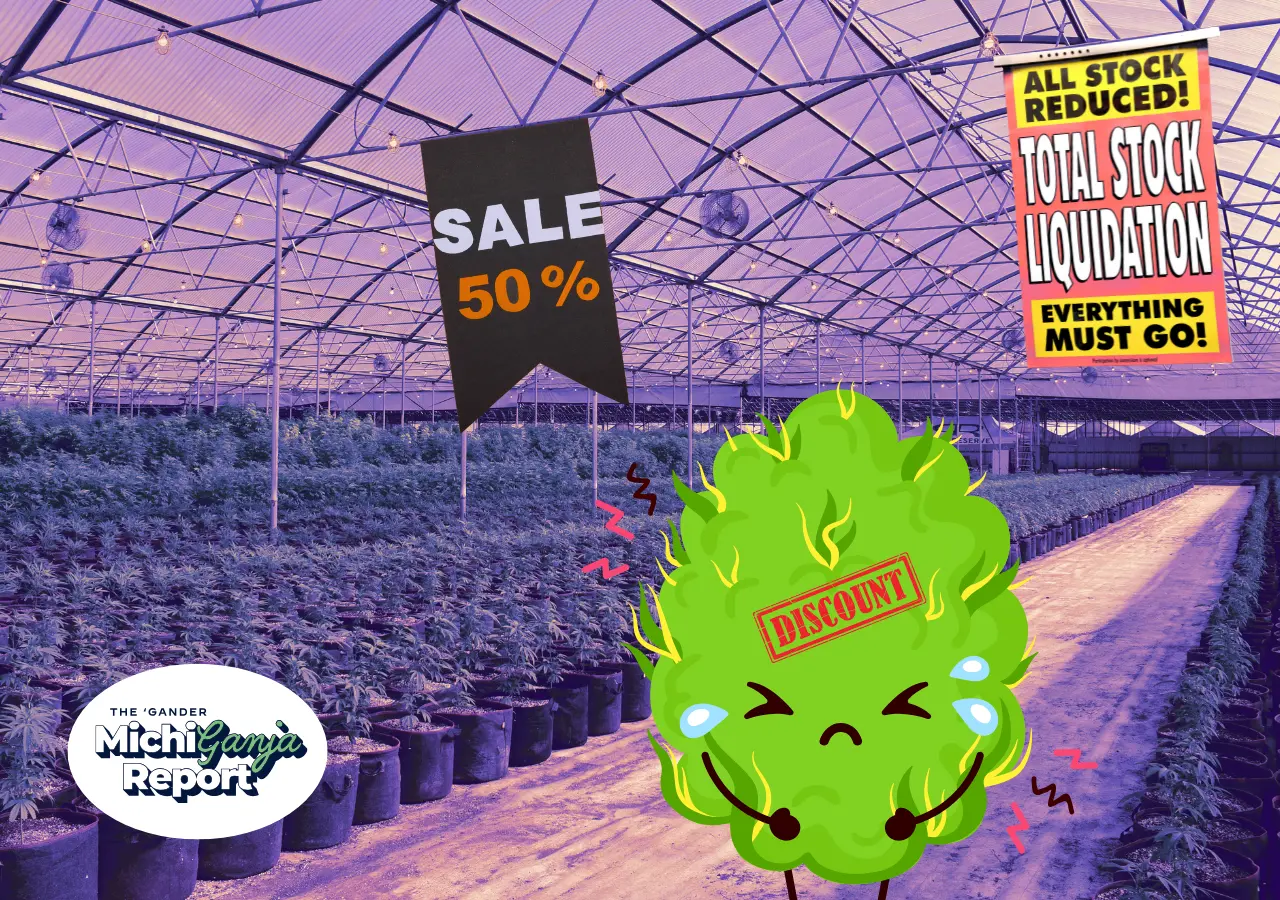
Michigan weed sales are slowing. Prices are crashing. Big-name companies are pulling out. Here’s what that means for stoners.
MICHIGAN—Let’s be honest: It’s one hell of a time to be a stoner.
There are now nearly 900 dispensaries statewide. That’s more than the number of Dollar General stores in Michigan—or the number of McDonald’s and Starbucks locations combined.
And this week, you can walk into just about any one of those stores and grab a full ounce of weed for about $63—less than an average trip to the grocery store, less than a tank of gas, and probably even less than what you paid back when your dealer showed up with a sandwich bag.
But while the deals are great for your wallet, they’re a flashing red warning sign for the industry: After years of explosive statewide growth, Michigan’s weed market has effectively hit a wall.
Sales are down—and have been for months. Prices have absolutely tanked. And some of the biggest players in the game are packing up and leaving Michigan altogether. Meanwhile, cultivators can’t sell their harvests fast enough, retailers are slashing prices to stay competitive, and state regulators are now urging the industry to call state lawmakers and ask for change.
So, what the hell is going on with Michigan weed? And what does it mean for you?
Let’s break it down:
Why is weed so cheap right now?
In a word: Oversupply.
Michigan’s cannabis market simply has more product than it knows what to do with—and that mountain of weed keeps growing by the month. As of June, cultivators were actively growing more than 3.2 million plants across the state. Meanwhile, more than 160,000 pounds of weed was still sitting on shelves or in storage at dispensaries statewide, just waiting to be sold.
And the kicker? Growers keep planting more.
Michigan doesn’t cap the number of dispensaries or grow operations allowed under state law. If they meet the criteria, they get a license—no matter how many businesses already exist.
That system has essentially created a race to the bottom, with hundreds of growers churning out products at a rate that far exceeds what the market can handle. And even as sales have dipped, state regulators are still approving dozens of new grow and retail licenses every month.
As a result, supply is way up. And prices have tanked.
Back in 2021, an ounce of weed in Michigan cost about $210 on average. By early 2024, it had dropped below $100. Now? It’s hovering at about $60—and dipping even lower at some shops.
That’s great news for bargain hunters. But for the folks trying to keep their cannabis businesses afloat, it’s been devastating. The price of wholesale weed has dropped so far that some cultivators are downsizing operations, selling products at a loss, or shutting down entirely.
Why are cannabis companies leaving Michigan?
In the first few years of legal sales, Michigan’s market exploded. Weed was flying off the shelves. Dispensaries were popping up everywhere. But now, with too much weed and too many shops, everyone is fighting over the same customers. And some are getting crushed.
Last month, TerrAscend—a cannabis giant that once operated 20 retail stores and four grow facilities across Michigan—cut its losses, laid off its staff, and pulled out of the state entirely.
“Michigan is an extremely difficult market,” the company’s chairman said in a statement.
TerrAscend isn’t alone. PharmaCann and Fluresh have also shuttered major cultivation operations, laying off hundreds of workers in the process. Smaller operators with less cash on hand are facing even tougher odds of survival as prices plummet and the competition heats up.
Even big names like Cookies have been impacted. And while the brands themselves haven’t disappeared completely, their parent company’s exit from Michigan marks a warning shot to the rest of the industry: If you can’t operate at a loss for a while, you might not make it at all.
Are sales really going down?
Yes. And it’s not just a blip.
After years of month-over-month growth, cannabis sales in Michigan peaked last August at just over $294 million. Since then, they’ve dropped nearly every month since—including a 4.2% decline from May to June alone—marking a 6.4% drop in sales from this time last year.
To be fair, Michigan still has one of the strongest cannabis markets in the country in terms of total sales and per-capita spending. But that doesn’t mean things are stable. As more shops try to sell more and more weed, the same total pie is being sliced into thinner and thinner pieces.
As a result, sales per store are reportedly declining. Razor-thin profit margins are even thinner—or non-existent. And the only people consistently making money in this environment seem to be the landlords, who still collect on rent whether a dispensary moves ounces or not.
Why isn’t the state doing anything about it?
Because they can’t—at least, not really.
Michigan law doesn’t give the state much power to slow down cannabis license approvals, even when the market is clearly flooded with too much weed. If someone applies for a license and meets the requirements, the state is required to approve it. There’s no cap and no waitlist.
The state’s Cannabis Regulatory Agency (CRA) does have enforcement authority over the industry but its role is mostly limited to compliance, not controlling the size of the market.
That said, state regulators are well aware there are problems. At a recent public meeting, CRA Executive Director Brian Hanna acknowledged that Michigan’s cannabis industry is facing serious challenges—from oversupply and falling prices to unlicensed operators and illicit products entering the legal market. But instead of promising a fix, he offered a suggestion:
“Please talk to your lawmakers right now,” Hanna said.
What’s next?
That depends on who shows up.
State regulators say the best chance for meaningful change in Michigan’s cannabis market will come from state lawmakers. And they’re calling for industry leaders to speak up for change.
In other words: If the industry wants a licensing cap, tougher enforcement, or more support to withstand financial pressures facing the industry, it’s going to need to organize and push for it.
Some are already calling for an advisory panel, lobbying legislators, and demanding stronger oversight to keep bad actors out of the system. Others are simply trying to outlast the storm.
There’s also cautious hope that as some cultivators shut down or scale back, prices may rebound. Some are also optimistic that federal cannabis rescheduling—if and when it happens—could ease the tax burden on retailers, freeing up cash to stabilize the market.
But until then, the survival of Michigan’s weed industry will likely come down to two things: which businesses have the stamina—and the financial backing—to ride it out and whether the people running them are ready to fight for a more sustainable future for the industry as a whole.
READ MORE: 6 quick hits of cannabis news from across Michigan

Want more cannabis news delivered right to your inbox? Click here to sign up for The MichiGanja Report—our free weekly newsletter about all things marijuana.
Support Our Cause
Thank you for taking the time to read our work. Before you go, we hope you'll consider supporting our values-driven journalism, which has always strived to make clear what's really at stake for Michiganders and our future.
Since day one, our goal here at The 'Gander has always been to empower people across the state with fact-based news and information. We believe that when people are armed with knowledge about what's happening in their local, state, and federal governments—including who is working on their behalf and who is actively trying to block efforts aimed at improving the daily lives of Michigan families—they will be inspired to become civically engaged.


10 unwritten rules of Michigan weed culture (that we finally wrote down)
Nobody voted on these. Nobody enforces them. But if you spend enough time around Michigan stoners, you’ll start to notice everyone playing by the...

6 quick hits of cannabis news from across Michigan
MICHIGAN—From smash-and-grabs and lab testing drama to mayoral politics and border-state busts, it’s been a busy week for Michigan’s weed world....

Information Entropy might be Michigan’s most trusted weed brand right now
The hype is loud. The weed is louder. And for once, Michigan stoners on Reddit are actually right about something. MichiGanja in Review is a column...

Why Omnino Cannabis wants Michigan stoners to actually know its name
A lean cannabis grow operation in Warren is navigating oversupply, falling prices, and the challenge of being recognized in Michigan’s crowded weed...

7 quick hits of cannabis news from across Michigan
MICHIGAN—The joints keep burning and the news keeps coming. Here’s your latest look at what’s happening across Michigan’s cannabis scene: PAVED WITH...





